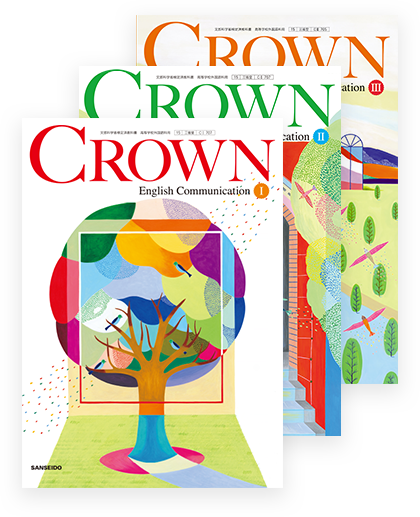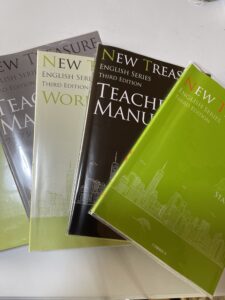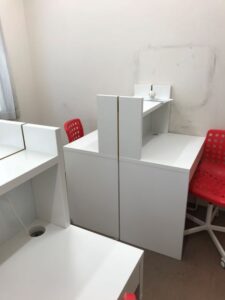生徒の為に作った、Crown English Communication の自宅学習用プリントです。
ジェーン・グドールはチンパンジーに関する彼女の仕事だけでなく、自然を保護するための奮闘でも有名です。こちらでは、ケンが彼女の人生や仕事について彼女にインタビューしています。
【 1 】
Ken: Dr. Goodall, ①thank you( ) ( ) time for this interview. ②I know that you ( ) many years ( ) chimpanzees in Africa. When did you first decide to go to Africa?
グドール先生、このインタビューのための時間①を取ってくれてありがとうございます。②私はあなたがアフリカのチンパンジーの研究にたくさんの年月を費やしてきたことを知っています。初めてアフリカに行こうと決めたのはいつですか?
Jane: ③( ) ( ) after I had read the Doctor Dolittle and the Tarzan books. When I was 11, I knew that ④( ) I would go to Africa to live with animals, study them, and write books about them.
- それは、ドリトル先生やターザンを読んだ後でした。11歳のとき、私は動物たちと一緒に生き、それらを研究し、それらについての本を書くために、④どうにかして、アフリカへ行くつもりなのだと分かった。
Ken: ⑤ I ( ) ( ) there are lots of young people who want to work with animals someday. How can they prepare themselves?
いつか動物たちに関わる仕事がしたいと思っているたくさんの若い人々がいることを、⑤私は確信しています。どうやったら彼らは準備できますか?
Jane: There are a lot of things you can do ⑥( ) ( ) ( ) understand animals. It is very important that you watch them and observe their behavior. It is also important that you write notes and ask questions. If you are really ⑦( ), you’ll have to work really hard. ⑧( ) ( ) ( ) every opportunity, and don’t give up.
動物を理解⑥するためにあなたができるたくさんのことがあります。あなたは彼らを見て、彼らの振る舞いを観察することが、とても重要です。あなたはノートを書き、質問をすることもまた重要です。⑦もし本当に固く決心をしたら、あなたは本当に熱心に働かなければならないでしょう⑧全ての機会を利用しましょう、そして諦めないでください。
【 2 】
Ken: You did a lot of fieldwork, ①( ) chimpanzees in the wild. Are they ②( ) ( ) ( ) like humans?
あなたは、野生のチンパンジーを①観察しながら、たくさんのフィールドワークを行ました。彼らは②何らかの点で、人間のような部分はありますか?
Jane: Chimps and humans ④have a lot ( ) ( ), ③( ) 98.6 percent of DNA. Their brains are very much like ours and much of their behavior is like ours. The members of a chimp family are very close, often helping ⑤( ) ( ). They can feel sad, happy, afraid, and angry.
DNAの98.6%が③一致しているので、チンパンジーと人間は④共通点を多く持っています。彼らの脳は私たちととても似ていて、彼らの行動の多くは私たちの行動に似ています。チンパンジーの家族のメンバーはとても親しく、しばしば⑤お互い助け合います。彼らは悲しみ、幸せ、恐怖、怒りを感じることもできます。
Ken: ⑥( ) ( ) their character ―⑦( ) ( ), are they friendly? Are they cruel?
彼らの性格⑥についてはどうですか? ⑦つまり(私が言いたいのは)彼らは友好的ですか?彼らは非情ですか?
Jane: They are usually friendly, but they ⑧( ) ( ) cruel, just like humans.
彼らはたいてい友好的ですが、ちょうど人間のように、非情にも⑧なり得ます。
Ken: Really?
本当ですか?
Jane: The meals sometimes attack chimps from another community to protect their territories. But they can be very kind and loving too. Once, when he was about three years old, a chimp called Mel lost his mother and⑨ was ( ) ( ). We all thought he’d die. But, ⑩( ) ( ) ( ), a 12-years-old male chimp called Spindle took care of him.
オスは他のコミュニティから来たチンパンジーを、彼らの縄張りを守るために、時々攻撃します。かし、彼らはとても親切で、愛らしくもなることがあります。かつて、彼が3歳くらいだった頃、メルと呼ばれるチンパンジーは彼の母親を失い、⑨一人置き去りにされました。私たちは皆、彼は死んだだろうと思っていました。しかし、⑩驚いたことに、スピンドルと呼ばれる12歳のオスのチンパンジーが彼を世話していました。
Ken: ⑪( ) ( ) ( )?
⑪どうやって?
Jane: Mel would ride on his back and share his nest at night. He shared his food if Mel ⑫( ) ( ) it. Chimps can indeed be loving and caring.
メルはよく彼の背中に乗り、夜は彼の巣を共同使用したものだった。もしメルがそれ⑫を求めれば、彼は食べ物も共有しました。チンパンジーは確かに、愛情があり、思いやりがあるようにもなります。
【 3 】
Ken: You travel all over the world, ①( ) ( ) about the conservation of nature. Do you have any comment?
あなたは世界中を旅して、そして自然保護について①演説をしています。あなたは何かコメント(意見)ありますか?
Jane: Yes, we humans must understand that wild animals have the right to live. They need wild places. ②( ), there are some kinds of living things that we must not destroy. Many drugs for human disease come from plants and insects. When we destroy a wild area, maybe we are destroying the cure for cancer ③( ) ( ) it.
はい、私たち人類は野生の動物は生きる権利を持っていることを理解しなければならない。彼らは野生の土地を必要としています。②さらに、私が壊してはいけないある種の生物がいる。人間の病気に効くたくさんの薬は植物や昆虫からできています。私たちが野生の土地を破壊するとき、ひょっとすると③知らないうちにガンに効く治療法を壊しているかもしれない。
Ken: I see.
なるほど。
Jane: Everything in nature is connected. Plants and animals ④( ) ( ) a whole pattern of life. If we destroy that pattern, all kinds of things can ⑤( ) ( ).
自然の全ては繋がっています。植物や動物は自然の様式全体(生態系)を④構成しています。もしその生態系を壊すなら、全ての種類の物事は⑤うまくいかなくなる可能性がある。
Ken: Could you say more about that?
それについてもう少し話してもらえますか?
Jane: Sure. ⑥( ) ( ) in England, rabbits were destroying farmer’s grain. The farmers killed the rabbits. Then foxes didn’t have enough to eat and they started killing the farmers’ chickens. The farmers then killed the foxes, and ⑦rats quickly ( ) ( ) ( ) and destroyed ⑧just ( ) ( ) grain ( ) the rabbits had eaten. We humans ⑨are ( ) ( ) ( ) destroying our environment and ourselves ⑩( ) ( ) it.
もちろん。イギリスの⑥ある時、ウサギが農家の穀物を荒らしていました。その農家はウサギを殺しました。すると、キツネは食べるものが十分になくて、彼らは農家のニワトリを殺し始めました(食べ始めました)。農家はキツネを殺し、すると⑦ネズミがすぐに数多く増え、ウサギが食べたのと⑧ちょうど同じ量の穀物を荒らしてしまった(食べてしまった)。我々人類は、環境と、⑩それとともにする自分たち自身を破壊する⑨危険にさらされています。
【 4 】
Ken: Are you worried about our future?
あなたは私たちの未来について心配していますか?
Jane: Yes, I am. But my hope ①( ) ( ) young people. ②( ) ( ) I started Roots & Shoots. It ③( ) ( ) a group of high school students in Tanzania in 1991. It is called Roots & Shoots because roots ④can ( ) their ( ) ( ) rocks to reach water. And shoots ⑤can ( ) ( ) a wall to reach the sunlight. ⑥The rocks and wall are the problems humans have ( ) to our earth.
はい。しかし私の希望は若い人々①にあります。②そうゆう訳で、私は、Roots & Shootsを始めました。それは1991年タンザニアの高校生のグループ③で始まりました。roots(根)は水に達するために、岩④に向かってゆっくりと進むことができるので、それは、Roots & Shootsと呼ばれています。そしてshoots(新しい芽)は太陽に到達するために、壁を⑤突き破ることもできます。その岩や壁は⑥人類が私たちの地球に対して引き起こしてきた問題です。
Ken: Is it a kind of club for young people?
それは若い人々向けのクラブのようなものですか?
Jane: Yes. We now have groups all over the world and each group chooses three projects: one to help people, one to help animals, one to help the environment. The world is a better place when a sad person smiles at you, when a dog wags its tail for you, or when you give water to a thirsty plant. ⑦That’s ( ) Roots & Shoots ( ) ( ) ( ).
はい。私たちは今世界中にグループを持っていて、それぞれのグループは3つのプロジェクトを選んでいます。:人々を助けるプロジェクト・動物を助けるプロジェクト・環境を助けるプロジェクト、の3つです。悲しんでいる人があなたに笑いかけるとき、犬があなたにしっぽを振るとき、あなたが乾いている植物に水をあげるとき、世界はより良い場所になります。⑦それが、Roots & Shootsの全てです。
Ken: Some final words?
何か最後に一言ありますか?
Jane: People should think about the ⑧( ) of the little choices they make each day. ⑨( ) ( ) buy? ( ) ( ) eat? ( ) ( ) wear? You are just one person, but what you do affects the whole world. The changes you make may be small, but if a thousand, then a million, finally a billion people all make those changes, ⑩this is going to ( ) a big ( ).
人々は、日々行う小さな選択の⑧結果について考えるべきです。⑨何を買うべき? 何を食べるべき? 何を着るべき?あなたはただ一人の人間ですが、あなたがすることは世界全体に影響します。あなたがする変化は小さいかもしれない、しかしもし千、そして100万、そして10億人が全てそれらの変化をするなら、⑩これは大きな違いを生むでしょう。
Ken: Dr. Goodall, thank you very much for sharing your ideas with us.
グドール先生、私たちにあなたの考えを共有してくれと本当にありがとうございました。



